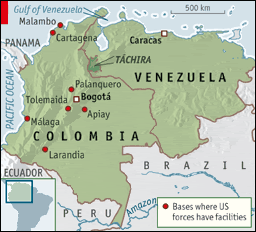La guerra Ja Ja.
 Venezuela and Colombia |
| Nov 12th 2009 | CARACAS Jaw-jaw war From The Economist print edition A hundred years of bombast |
 |
HUGO CHÁVEZ'S belligerent rhetoric trades at a substantial discount. So when on November 8th he announced during his weekly television show that Venezuela's army should "prepare for war", apparently with Colombia, this was greeted with concern but not panic. Sure enough, three days later Mr Chávez was denying his message was meant as a threat. But his verbal salvoes aggravate the mistrust between the two neighbours. The latest batch was triggered by an agreement signed on October 30th under which Colombia has granted the United States access to up to seven military bases. Both governments insist that this poses no threat to other countries. It formalises existing arrangements under which the United States helps Colombia combat drug traffickers and guerrillas; Colombia will now also host anti-drug surveillance flights over the Pacific by American planes previously operating from Ecuador. Mr Chávez claims that the agreement is an "open aggression" aimed at ousting him from power. Any attack by the United States or Colombia would trigger "a 100-year war", he said. When news of the accord broke in July, he responded by freezing cross-border trade (which was flourishing). That has thrown many people out of work in Venezuela's border state of Táchira, aggravating a climate of lawlessness there. Recent weeks have seen the kidnap and murder of 11 men, eight of them Colombian, the murder of two Venezuelan national guardsmen; deportations of undocumented migrants and the arrest on both sides of alleged spies. In early November Mr Chávez ordered the deployment of 15,000 national-guard troops to border areas. It is not clear how many have arrived. Some seem to have gone to the southern border with Brazil, to deal with illegal mining. Venezuela lacks the trucks and planes needed to move large numbers of troops quickly. In any conventional war, Colombia's army would surely win. It has been hardened by American aid and training and years of action against the FARC guerrillas. Venezuela's only hope would be a quick air strike, using recently acquired Russian Sukhoi jets. It has doubtless occurred to Colombian officials that the presence of Americans at their main air bases might cause Mr Chávez to think twice before launching such a strike. According to Alberto Müller, a retired general and former leader of Mr Chávez's United Socialist Party, Venezuela is waging "a different kind of war", for public opinion rather than territory. If so, Mr Chávez seems to be losing it. In a recent survey by Datanálisis, a polling firm, 80% of respondents opposed a war with Colombia, and a big majority opposed trade sanctions. To complicate matters further, several million Colombians live in Venezuela. Across the border, Mr Chávez's constant threats seem to have caused Colombians to rally round their president, Álvaro Uribe, who may run for a third term in May. Venezuela will hold a legislative election in September. Mr Chávez appears to be seeking an external enemy to distract attention from mounting problems, ranging from regular electricity blackouts to inflation and public-spending cuts. Colombia this week said it would complain to the Organisation of American States and the United Nations about Mr Chávez's unneighbourly behaviour. Brazil has offered mediation; so might Spain. That could be useful. After all, those who constantly talk of war sometimes trigger it, accidentally or on purpose. |
Open article at "The Economist" Web Site |
Copyright © The Economist Newspaper Limited 2009. All rights reserved. |
